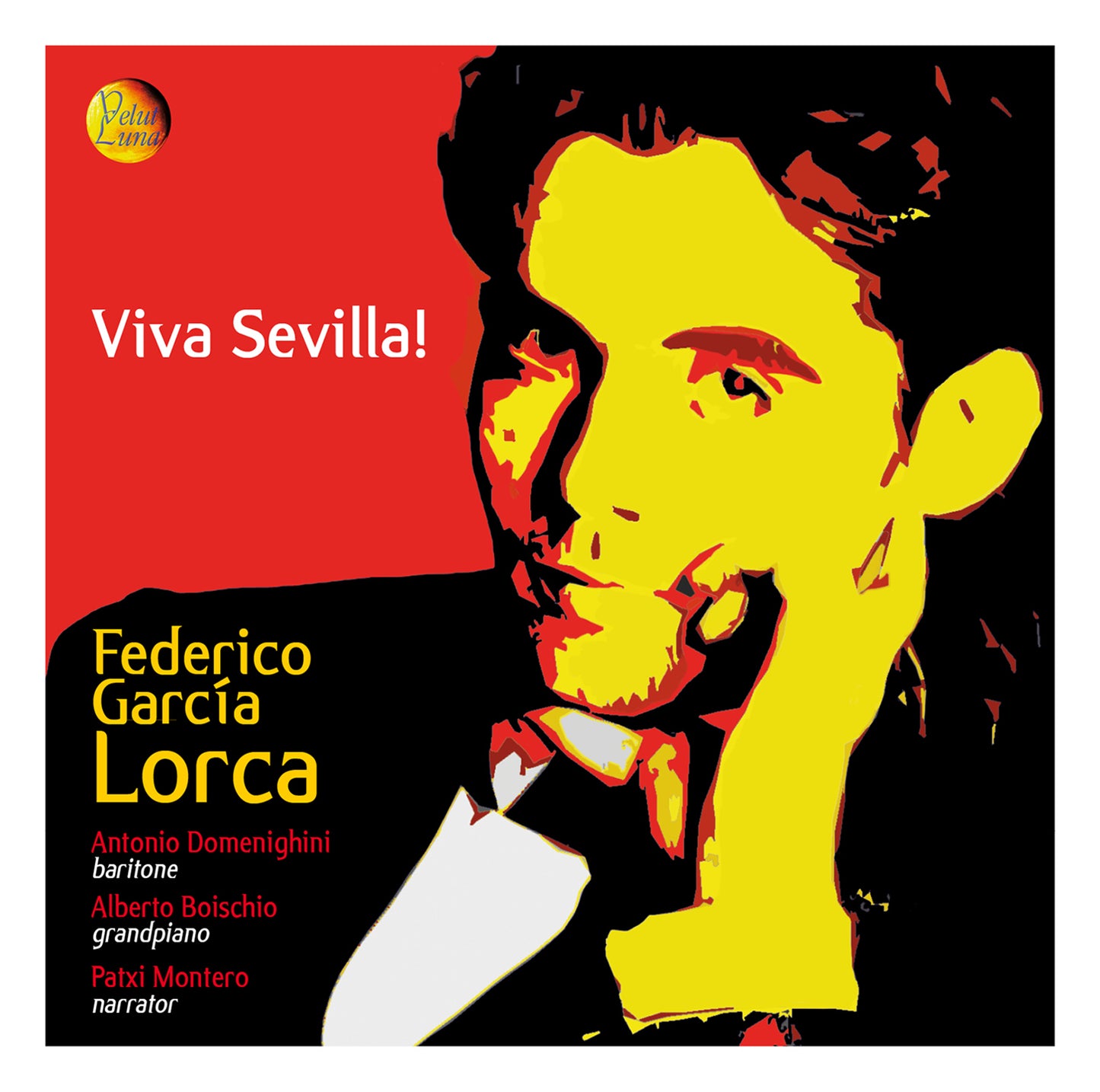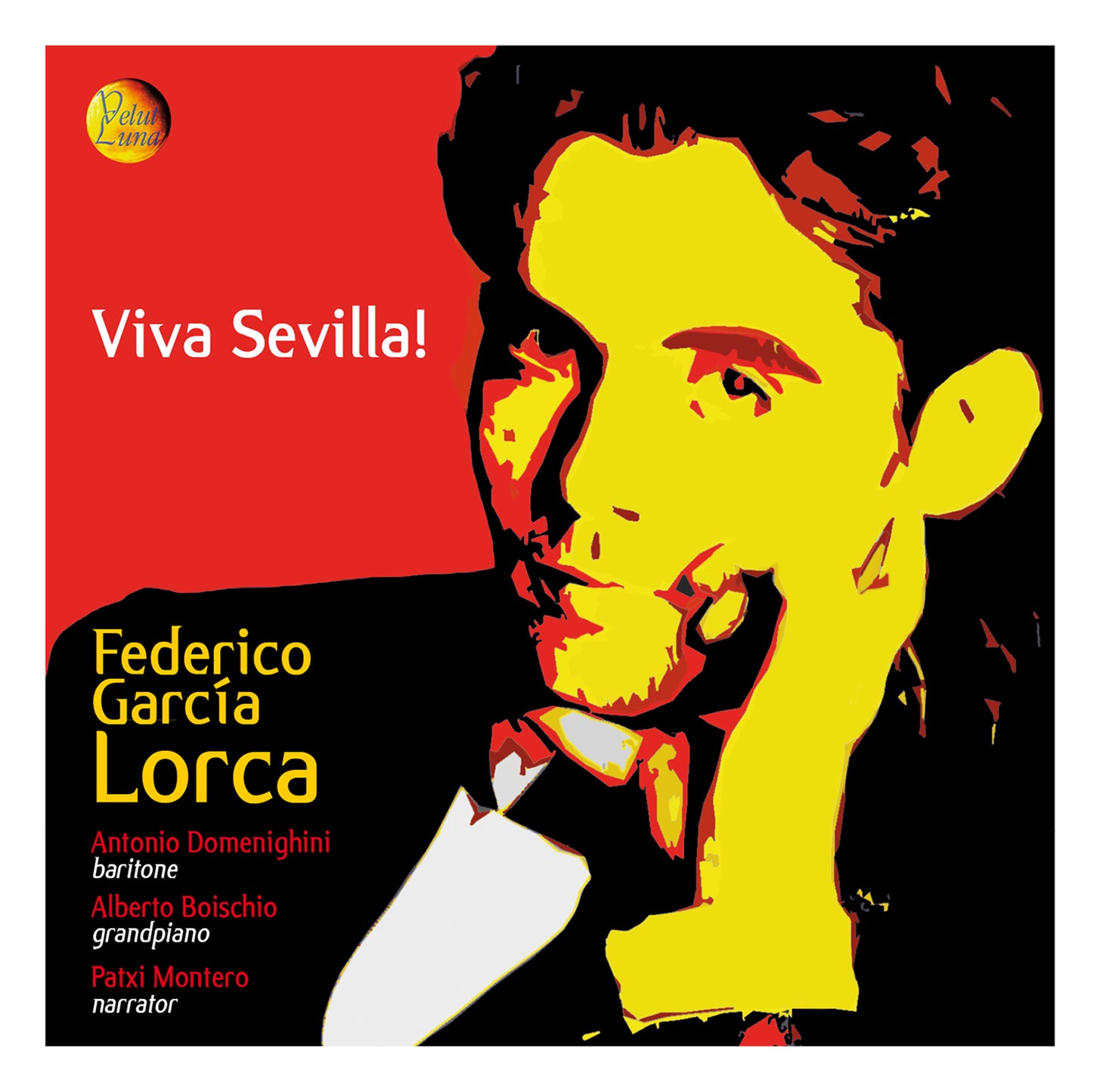Velut Luna
VIVA SEVILLA! - Federico Garcia Lorca
VIVA SEVILLA! - Federico Garcia Lorca
Genere musicale: Folk
Disponibile
Impossibile caricare la disponibilità di ritiro
VIVA SEVILLA! (CVLD226)
Selection and Arrangements By Federico Garcia Lorca
Music for piano by Isaac Albeniz, on poetry of Gustavo A. Becquer
Tracce
01 - Anda Jaleo (F.G.Lorca), 2’24”
02 - Los cuatro melerose (F.G.Lorca), 1’48”
03 - Besa el aura…. (G.A.Becquer – I.Albeniz), 1’04”
04 - Las tres hojas (F.G.Lorca), 2’13”
05 - Los mozos de Monleón (F.G.Lorca), 6’26”
06 - Del salón en el ángulo..... (G.A.Becquer – I.Albeniz), 0’43”
07 - Las morillas de Jaén (F.G.Lorca), 2’28”
08 - Sevillanas del siglo XVIII (F.G.Lorca), 2’56”
09 - Me ha herido.... (G.A.Becquer – I.Albeniz), 1’05”
10 - El café de Chinitas (F.G.Lorca), 3’03”
11 - Nana de Sevilla (F.G.Lorca), 5’29”
12 - Cuando sobre el pecho inclinas.... (G.A.Becquer – I.Albeniz), 1’05”
13 - Los pelegrinitos (F.G.Lorca), 4’20”
14 - Zorongo (F.G.Lorca), 2’30”
15 - De dónde vengo?.... (G.A.Becquer – I.Albeniz), 1’28”
16 - Romance de Don Boyso (F.G.Lorca), 5’21”
17 - Los reyes de la baraja (F.G.Lorca), 1’54”
Total time: 46’25”
24bit/96kHz original recording made at Papillons Studio, Padova, Italy, on February 19th, 2001
Production: VELUT LUNA
Recording and mastering engineer: MARCO LINCETTO
Note
L'attività più importante nella vita di Federico García Lorca, a parte l'attività letteraria, è stata quella musicale. Entrambi sono strettamente legati, in modo che possiamo notare come la sua poesia, lirica o drammatica, è piena di ispirazione musicale, non solo nei temi e nelle forme di espressione, ma anche nella struttura, nello stile e nell'emozione che suscita.
Da bambino studia musica e sembra che questa, per un certo periodo, sia stata la sua principale e precoce vocazione. Durante l'adolescenza la musica e la letteratura si contendevano la supremazia, e quest'ultima vinceva.
La sua vocazione musicale è rimasta sempre più circoscritta al campo della musica folk.
Cresciuto a Granada, da bambino ebbe l'opportunità di vivere in contatto diretto con la campagna e il mondo contadino, conoscendo i loro canti e le danze popolari.
Ciò che ha imparato durante l'infanzia rappresenta la profondità più intima e genuina della sua conoscenza della musica popolare spagnola.
Studiò profondamente i canzonieri più importanti, e in particolare quelli di Felipe Pedrell e Barbieri , che gli permise di conoscere non solo la musica popolare conservata nella tradizione di altre zone della Spagna, ma anche la musica antica trascitta dai manoscritti, dai libri medievali e dal XVI e XVII secolo ( quindi lontano nel tempo e nello spazio).
Per la scelta dei canzonieri aveva a disposizione solo la nota musicale melodica, senza accompagnamento alcuno, di melodie mai sentite prima e alle quali non era stato utilizzato.
Vivendo in Andalusia, non ebbe molte occasioni di ascoltare i canti dei contadini castigliani o quelli del nord della Spagna e per conoscere la loro musica dovette ricorrere alla conoscenza di dilettanti e esperti folk di quelle zone.
Ma il suo grande istinto musicale e popolare lo aiutò a percepire rapidamente le caratteristiche di ciascuno di essi. Accompagnava i brani con i suoi arrangiamenti che, nonostante la loro semplicità, erano di grande efficacia, perché riuscivano a svelare l'armonia e il ritmo impliciti in ogni canzone.
Tutto ciò dimostra che il suo lavoro nel campo musicale folk non era l'opera sistematica e metodica di uno specialista, ma quella di un artista che, nel popolare, cercava il piacere di scoprire e di eseguire un'arte diversa, piena di originalità, perfezione e bellezza.
Antonio Domenighini è nato a Colonia, in Uruguay ed è cittadino italiano e uruguayano. Ha studiato musica presso l'Accademia di Musica Juan J.Castro, a Buenos Aires, in Argentina.
Si è laureato come direttore di coro e allo stesso tempo ha studiato come cantante professionista.
Fu direttore di un centro musicale per bambini, durante gli anni in cui visse in Italia, a Padova.
Fu il fondatore del Bach Ensemble a Padova; attualmente vive a Montevideo, Uruguay ed è direttore del Coro Nazionale di Radio e Televisione dell'Uruguay ed è docente di "Direzione di Coro" presso l'Università della Repubblica.
Alberto Boischio, laureato con lode al conservatorio C. Pollini di Padova con G. Di Toma, ha frequentato corsi di perfezionamento con Gyorgy Sandor, Aquiles DelleVigne, Joaquin Achucarro, Piernarciso Masi, Dario de Rosa ed è stato ammesso all'International Ecole de Piano di Losanna diretta da Fausto Zadra sotto la cui guida specializzata in tre anni. Primo premio in concorsi musicali nazionali e internazionali, ha partecipato regolarmente a stagioni di concerto in Italia e al l'estero come solista, solista con orchestra e in particolare con ensemble da camera. Nel 1994, con un duo pianistico, ha vinto una borsa di studio presso la Chigiana Academy nel corso tenuto da Joaquin Achucarro, vincitore del 2o premio alla "Città di Gussago" e primo premio al concorso pianoforte europeo "Città di Moncalieri". Dal 1991 in duo con il violinista Stefano Furini è stato presente in varie stagioni concertistiche in Italia e in Europa ottenendo ampio consenso pubblico e critico e ottenendo nel 1995 il primo premio al concorso di musica da camera "F. Schubert" a Ovada (To).
Nel 1996 con Furini e il violoncellista Jacopo Francini ha fondato il Trio Rachmaninoff che ha vinto il primo premio al concorso internazionale di musica da camera "Città di Pinerolo. Regolarmente impegnato in attività solistica e cameristica, nel 2000 con un concerto al corso di perfezionamento a Riva del Garda inizia una collaborazione con Domenico Nordio e Alessandro Carbonare che si conclude con un importante disco registrato nel 2001. Nel febbraio 2003 ha registrato i 24 Preludi op. 37 di Ferruccio Busoni e altre rarità in prima esecuzione
pubblicato dalla prestigiosa rivista specializzata CD Classics. Registra per "Velut Luna Recording" come solista e in ensemble cameristico ottenendo ampia approvazione da stampa specializzata nazionale ed internazionale e critica (Fedeltà del Suono, CD Classics, Audio Revue, Suonare News).
Share

-

Spedizioni prodotti fisici
Spedizioni gratuite in Europa (UE), a partire da 4 articoli - Richiedere quatozione per i costi di spedizione per i paesi non UE
-

Consegna prodotti digitali
La consegna dei prodotti digitali avverrà direttamente sul sito e riceverai anche una email con il link per il download dei file.
-

Scrivi una recensione
Qui sopra puoi scrivere una recensione sul prodotto che hai acquistato, saremo felici di conoscere la tua opinione.


